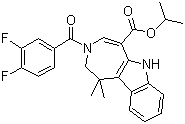
Cat No:LP000203
Product Name:WAY362450
CAS No:629664-81-9
Purity: ≥99%
Solubility: In DMSO
Storage: -10°C
WAY-362450 is a potent, selective, and orally bioavailable FXR agonist (EC50=4 nM). WAY-362450 is highly selective, as no significant cross-reactivity with these receptors (LXRα, LXRβ, PPARα, PPARγ, PPARδ, RXRα, RARγ, VDR, SXR, ERα, ERβ, GR, AR, MR, and PR) is observed at concentrations up to 10 μM. WAY-362450 displays potent agonist activity in the FXR reporter gene assays and on FXR target genes in cell-based assays. In promoter assays, utilizing reporter constructs under control of the human bile salt excretory pump (BSEP), human small heterodimer partner (SHP), and mouse intestinal bile acid binding protein (IBABP) genes are up-regulated by WAY-362450 with EC50 of 17, 230, and 33 nM, respectively. In addition, WAY-362450 significantly induces mRNAs encoding for BSEP, SHP, and IBABP in human cell cultures at 1 μM (13-, 2-, and 20-fold, respectively)[1]. WAY-362450 potently induces luciferase reporter expression with an EC50 of 16 nM. WAY-362450 is a potent stimulator of endogenous FXR gene activation in mouse AML12 cells and in primary human hepatocytes[2].
WAY-362450 also shows potent effects on cholesterol and triglyceride lowering in LDLR-/- mice and antiatherogenic activity with respect to reduction of aortic arch lesions. Oral administration of WAY-362450 to LDLR-/- mice results in lowering of cholesterol and triglycerides. Chronic administration in an atherosclerosis model results in significant reduction in aortic arch lesions. WAY-362450 is dosed in rat at 3 mg/kg (po and iv) and shows good oral bioavailability (38%). There is a protracted half-life of 25 h, modest volume of distribution, and low clearance (3.3 L/kg, ~10% of hepatic blood flow). Additional pharmacokinetic studies in mice and higher species have been completed, and the data will be reported elsewhere[1]. In rats, WAY-362450 results in an elevation in HDLc levels, whereas in hamsters it causes a reduction similar to that observed in mice[2] Treatment of wild-type mice with 30 mg/kg WAY-362450 results in induction of SHP expression in wild-type mice but not in FXR-/- mice. Consistent with the known effects of SHP induction on bile acid synthetic gene expression, WAY-362450 strongly represses expression of the CYP8B1 bile acid synthetic gene in wild-type mice but had no effect on CYP8B1 gene expression in FXR-/- mice[3].
